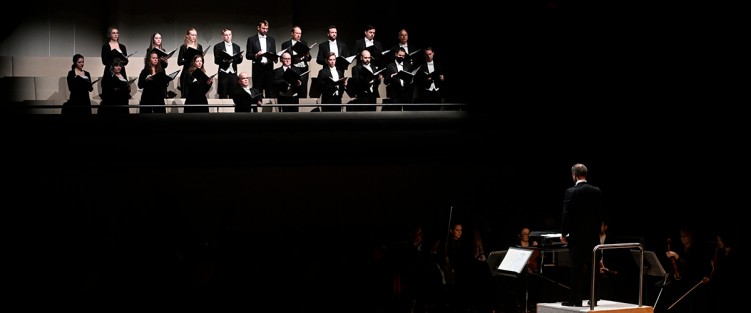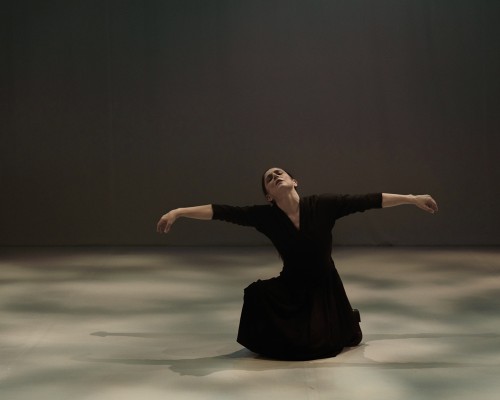 Let’s start by looking back — to a Toronto Symphony concert in January this year. Second half of the concert was the Mozart Requiem, with the full Mendelssohn Choir (TMChoir) doing the vocal honours. But what made the evening special was how the first half set the scene.
Let’s start by looking back — to a Toronto Symphony concert in January this year. Second half of the concert was the Mozart Requiem, with the full Mendelssohn Choir (TMChoir) doing the vocal honours. But what made the evening special was how the first half set the scene.
The concert opened with the sopranos and altos of the Toronto Mendelssohn Singers (TMSingers) entering in darkness, singing, a cappella, Hildegard’s haunting O Virtus Sapientiae. Two orchestral pieces followed (Mozart’s Masonic Overture and an arrangement of Beethoven’s Grosse Fugue.) And the half closed with the TMSingers’ full chamber contingent turn again, divided up, antiphonally, into two choirs, in Gregorio Allegri’s Miserere mei, Deus.
The evening felt like an artistic whole. As such, it spoke to the wisdom of the TMChoir’s decision to formalize the choir’s professional core as a chamber ensemble. The chamber choir offers an intimacy that is the emotional flip-side of the main choir’s power. As such it offers the potential for exploring edgier repertoire, new venues, and inspiring creative partnerships.
September 22 & 23 is a case in point. Titled “In Time: at the Intersection of Music & Dance”, the concert renews a creative partnership formed during the darkest days of the pandemic, with choreographer/dancer Laurence Lemieux’s Citadel + Compagnie. Performances take place in Jeanne Lamon Hall, at Trinity-St. Paul’s Centre, unfamiliar territory for both ensembles. The repertoire, on the other hand (Handel’s Dixit Dominus and Bach’s Christ lag in Todesbanden), is part of the musical DNA of a venue that, as home to the Tafelmusik Baroque Ensemble for decades, wears Period music like a coat of paint!
I reached out to Lesley Emma Bouza, a long-standing member of the TMChoir’s professional core, for her thoughts on the TMSingers revival.
WN: Let’s start with what makes singing in the big choir special.
LESLEY BOUZA: I love singing in big choirs. My first choir experience was in a big symphonic choir, at the University of Guelph under conductor Dr. Marta McCarthy. I fell in love with the feeling of having my voice be a part of a massive sound machine that can achieve anything from pianissimo to triple forte and beyond. I’ve been an instrumentalist and a singer in every size, shape and type of ensemble and for me the experience of singing in a large choir satisfies so many musical needs.
I love the camaraderie, and I love the feeling of letting my voice soar within this group. I I love feeling how my voice blends into the group around me and how we all complement and amplify each other’s voices. The physical sensation of this type of singing is incredibly cathartic and I’ve often found myself swept up emotionally.
Is there anything it’s not good for? The only thing that comes to mind for me is that you need to be very aware of your technique and how your sound fits into an ensemble that large. You don’t have the same feedback of hearing yourself as in a smaller ensemble, so the temptation to push your sound out to be able to hear yourself better is very strong and can lead to vocal fatigue quite quickly; especially with some of the repertoire that you encounter in this type of choir … Beethoven’s 9th, Carmina Burana … other large scale works with a lot of sustained fortissimo singing.
What does chamber singing offer that a big choir cannot? The opportunity to prepare music in very detailed ways. Often you’re singing only a few voices to a part, or, as in the case with TMSingers’ 2022 performance of Path of Miracles, even one to a part. You need to come prepared and have the confidence to hold down your part, despite everything else that might be going on – multiple tonalities and rhythms at the same time; singing in various languages, portraying different characters; sensitivity to the style of the music. Professional choristers in chamber choirs get to sing so many different genres of music within our art form, and it’s so satisfying to switch from music that was written 200 years ago in German to music that was written last month in Arabic.
Is the camaraderie different? In these choirs you can really feel how each member contributes to the team. This leads to discussions of how to interpret the music. Of course the conductor has the final say, but the singers can make choices that contribute to the interpretation in a real way as well. JS [Jean-Sébastien Vallée] is a particularly collaborative conductor to sing for; he works with us as a member of the ensemble, not just its leader.
What are you most looking forward to in this TMSingers revival (apart from being paid)? I have been a member of the paid, professional core of the TMChoir for a long time, but that group has existed almost entirely to support the larger choir: a piece or two in a TMChoir concert; rare performances at weddings or other events. The professional choristers within the TMChoir have long been some of the most skilled musicians that I’ve had the pleasure to work with, and it’s wonderful to get our own concerts, singing challenging music, showcasing our solo abilities and contributing to the vibrant chamber music scene in Toronto.
It’s not just a “revival” in the sense of planning concerts and hiring singers. The leadership of the TMChoir has listened to us describe the challenges that professional choristers working in and around this city have had for a long time. Being a professional chorister feels a bit like the Wild West; we are not eligible to be a part of any kind of union or musicians association, and so we rely on negotiations with the organizations who contract us to create positive and respectful working environments.
The creative concerts that we’ve gotten to perform so far – The Little Match Girl Passion and The Pilgrim’s Way – are the icing on the cake. In particular Little Match Girl really stayed with the audience and felt like a concert which was contributing to an important conversation in our city. I like to think our taking a risk in weighing in on the mental health and housing crises in this city may have made a difference in some way.
And this upcoming collaboration with Citadel? I am thrilled. Art is uplifted when different mediums, genres and cultures come together. If this art form is to survive I think we need to present it in ways that resonate with audiences that may not be drawn to the more traditional choral aesthetic. Dance is a no-brainer to pair with early music; so much of this music is built upon a foundation of dance forms. I can’t wait to see what C+C brings to incredible works that are always challenging and fun to sing: but they’ve been performed many. many times in this city in a conventional way. Adding dance sheds a new light on timeless work and adds relevance for a modern audience.
For Laurence Lemieux, Citadel Dance’s artistic director, the hard work for Handel’s Dixit Dominus still lies ahead. “We started on the Handel in studio in June,” she says, “but it’s a big work, so a complex
challenge. I’ve given myself till September 1 on the choreography, then we have September to rehearse, separate from the choir, until the week of the show. We get three rehearsals together in the hall to work on timing – crucial for dancers. We take our overall tempos from the musicians, but after that certain things become non-negotiable. Tiny changes in tempo interfere with the muscle-memory practice dancers depend on to fulfill our intentions.”
For Bach’s Christ lag in Todesbanden, which she will dance solo, as she does in the 2021 filmed collaboration, the hardest work, the emotional heavy lifting, has already been done. “People were dying all around and I was working in isolation. Overwhelming as it was, it became an important journey to express. The sorrow of the Virgin Mary with a dying son became an even deeper sorrow, for all those lives being lost. If I had been an angel, I’d have been very busy, with the passing of all those souls.”
David Perlman can be reached at publisher@thewholenote.com





